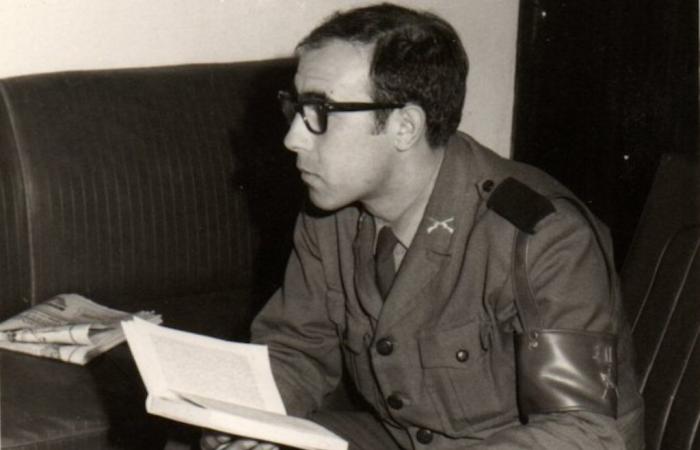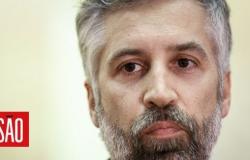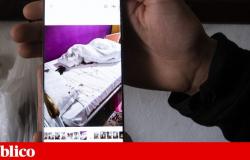Starting at the beginning: you were born in Gondomar…
I was born in São Cosme, Gondomar, in 1944. My parents are from São Cosme but at the time they already lived here in Aveiro.
When you were born, did your grandparents already live here?
Already.
I did not know…
I had an older brother, who was named after you…
Or am I the one with his name…
Well… My father had found a job here in Aveiro, in some olive oil warehouses, Duarte Santos and Correia, in Esgueira. Meanwhile, they had already gotten married and came to live in Esgueira, in a house that still exists, almost opposite the Capela funeral home. But as they had absolutely no family here, all three of us, the three brothers, were born in São Cosme.
Were you born in someone’s family home?
I never asked my mom, but I would say yes. Possibly at my maternal grandparents’ house. At that time births were generally at home, with the help of a midwife.
What did your grandfather and grandmother do before coming to Aveiro?
My mother had completed a Primary Teaching course, just like her mother, my grandmother Berta.
I didn’t know that either…
But he never exercised. Because then they got married, came to Aveiro, and had their children. She became a maid, taking care of the house and children. It was very usual. Few women worked outside the home. But my grandmother was a teacher at primary school in São Cosme.
And the grandfather?
My father studied at the equivalent of an industrial and commercial school. He learned some accounting stuff. And then, through a guy somewhere from Gaia, who was also a partner in the olive oil warehouse in Esgueira, he managed to get a job as a bookkeeper at that firm. They came here and stayed here to live.
The idea I have is that the grandfather traveled a lot for work…
Many years later he became a partner in the firm – the other two partners gave him a partnership, leaving him with a small share. And at that time – I was already grown up – I made a lot of car trips to visit customers, make sales and receive money. I still remember my father going to customers’ houses and them paying in cash, and I sometimes helped him count the bills. It still covered a fairly large area. I remember going with him a number of times to Adémia, Cantanhede… The biggest trip he did, on Saturdays, in a 2 Cavalos van, was to Beira Alta – he even went as far as Trancoso, Penedono, Viseu…
And the roads were nothing like they are today…
May I help. Albergaria, Vouzela, Viseu, Castelo de Paiva and so on. It was all day.
So your childhood and youth were spent entirely in Aveiro. I thought you still lived in Gondomar…
No. We would go there sometimes in the summer, when we were younger, to spend a week or two at my maternal grandparents’ house. Or sometimes on weekends, by train or by car, when my father bought the old bedpan.
Did you go to school in Esgueira?
I went to primary school in Esgueira, where the Parish Council is now.
And do you remember the teacher?
I remember two. One was Maria Isabel Ramos, who was married to Henrique Ramos, from the photography house. Which was mean.
[Henrique Ramos foi um conhecido fotógrafo da cidade de Aveiro]
Did you still take a few hits?
Once he slapped me, my ears rang. Then I remember Mrs. Maria Luísa, her husband was Guerra de Abreu, who drew very well and made caricatures for the Coast. This lady was very nice.
[Alfredo Guerra de Abreu foi um artista aveirense. O seu nome figura na toponímia da cidade]
And after primary school?
From my fourth grade class, I and another boy from Esgueira were the only ones who continued our studies. We went to the Liceu Nacional de Aveiro, where the José Estêvão School is now. The primitive high school, the current Escola Homem Cristo, was still in operation, where I also attended. I finished high school in 1962, and that year I went to the Faculty of Arts at the University of Coimbra, where I studied Romance Philology for six years. I ended up going another year because in the last year I couldn’t take a course – the teacher was Pimpão, who was the best at the college.
And why Romance Philology?
I was more inclined towards letters, I always have been. At the high school I have a very fond memory of the rector of that time, Dr. José Pereira Tavares, who was an excellent person, a good teacher, a scholar. I never had a great inclination towards mathematics. And I had a teacher who had no patience and insulted his students. I remember one time he told me to go to the blackboard, which was on a higher level, on top of the platform, just like the teacher’s desk…
In a position of authority…
Exactly, above… I couldn’t do the exercise and he said something that I never forgot, when I was 11 years old: “look, my boy, go dig potatoes for Gafanha”. And he told me to sit down. And he marked me. A person feels humiliated.
[José Pereira Tavares nasceu no Pinheiro da Bemposta em 1887. Foi reitor do Liceu de Aveiro e autor de várias obras de carácter didático. Lançou, com Álvaro Sampaio, a revista Labor, voltada para os problemas do ensino liceal. Morreu em 1983, aos 96 anos]
Has going to university always been a goal of yours?
Yes, I already had the idea of becoming a teacher. It’s not that they earned a lot, but at that time the teaching career was relatively prestigious. But it wasn’t because of that. It got into my head that I would enjoy being a teacher. And I liked the course.
What year did you finish the course?
In 1969. I still participated in academic struggles. There were very fierce fights, the riot police were there… When I finished, I started looking for a school. He had academic qualifications, but no pedagogical training. You had to do an internship to join the ranks. I spent two years at Escola Fernando Caldeira, in Águeda, teaching Portuguese and French.
How did you join the military service?
I had been to the inspection a number of years ago, here in Aveiro, in a building where Rua Von Haff opens. I and others stood together, so the doctor could see us… But as I was studying, it was allowed to request a postponement of incorporation. I kept putting it off until I finished the course and I still taught two years of classes in Águeda. It was only later that I joined the troops, in October 1971.
Where?
In Mafra. That’s where I was told to go. I was there six months. The first three months were when recruitment was carried out and the next three were for the specialty. The infantry fell to me. I remember very well that the first three months, at the end of autumn and the beginning of winter, were radiant weather, always sunny. The three months of specialty were terrible, always raining and cold. I especially remember the week in the field, exercising in the mountains, where we slept in miserable tents where three people had to cram in. I have only one good memory from that time, besides the camaraderie, which was the physical preparation with which I left there.
And after Mafra?
I went to Caldas da Rainha, to the 5th Infantry Regiment. Unlike Mafra, where conditions were terrible, in Caldas the barracks were relatively new. When I finished my specialty, I was given the rank of aspiring militia member – I was a militia member, that is, I was not a soldier from the military academy. I was placed as an instructor at the militia furriel school. I was there another six months.
And was it then that you came to Aveiro?
He was. In November 1972, I think, and I stayed until the end of 1974. I was placed as an aspirant in the 10th Infantry Regiment. First it worked where the GNR is now, then it started working next to the park, in the barracks that it was, in the meantime , demolished. When the 25th of April was, that was where the RI10 was.
What rank did you have at the time?
Then a year later I became an ensign.
At that time, the family had already been hit by a tragedy, the death of your brother in the war…
It was in 1971. He and another man died in Angola, in an ambush north of Luanda. He was 27 years old and had two children. And for that reason I didn’t end up with my back to the colonies. I was exempt from being mobilized overseas. My course buddies in Mafra all went, without exception, to Africa.
In your youth, early adulthood, did you feel the oppression of the regime in any way?
Yes, that was felt. There was a lot of reserve on the part of people, they avoided speaking in public except in restricted circles with whom they had trust. There was fear, PIDE was always alert. There was a climate of oppression and there was news of people being arrested. My brother was still in prison for a few days in Porto, on Rua do Heroísmo. There was a time when he managed to get hold of a pistol or two. He wasn’t supposed to shoot, but he had a passion for guns – he was also a hunter, like my father. I know that through someone PIDE found out that he had pistols, someone made a complaint. And one day, almost at dawn, PIDE came knocking on the door. Two guys took my brother to Porto. That’s how things worked. PIDE was omnipresent.
You were 20 years old, right?
When it was April 25th I was 29 years old. I read a lot on subjects related to politics. I was very aware of the regime in which we lived. I have a good memory of a bookstore that no longer exists, which was Vieira da Cunha, you probably don’t remember it anymore…
[A Livraria Vieira da Cunha situava-se no início da Rua Agostinho Pinheiro. Já fechou há muitos anos]
I don’t know if I don’t remember. Wasn’t it on the avenue?
Almost in front of Teatro Avenida…
Then. I have a vague memory of that bookstore…
I got to know you, even though I didn’t have any trust with him. As a bookseller there I managed to obtain books that were only obtained clandestinely, and which were offered for sale clandestinely. Censorship was relentless. I went there often. There was a kind of back room in the store, and when I went there I remember him saying, quietly, “I have something interesting there”. And I also bought records…
You have a good collection of vinyl records…
They’re for you.
And in the meantime you met the mother…
Only after April 25th. I finished my military service in October 1974, I did three years right. Artur, my brother-in-law and your uncle were also here at the barracks. He was related to the mother of a communist leader, Francisco Miguel, who was from Alentejo and was imprisoned for many years. I met Artur in the army and I met his mother through him, at the end of 1974. And when I finished my military service and joined the reserves as a lieutenant, I tried to make my own life. I started teaching Primary Teaching for two years, until 1976.
[Francisco Miguel nasceu em Baleizão, Beja, em 1907, filho de camponeses pobres. Na década de 1930 aderiu ao PCP e entrou na clandestinidade. Foi dos presos políticos que mais tempo passou encarcerado, num total de 21 anos, no Tarrafal, Caxias ou Peniche. Morreu em 1988]
And then you made your life as a teacher…
Then I went to Escola João Afonso to do my internship. I was there for three years, where I was also an internship supervisor. Then I was placed in Esgueira, where I stayed until the end.
Aveiro at that time was a very different city…
It was much smaller, calmer. When I was a kid and teenager, Aveiro-city was completely separate from the surrounding areas, like Esgueira. They were different worlds.
Was there a lot of poverty?
There was. Living conditions at that time were bad. When I finished primary school, only I and another classmate continued studying for high school. Everyone else went to work – they started working when they were 10 or 11 years old. People today, from the younger generations, have no idea what living conditions were like. I still remember seeing a lot of people barefoot.
But did your family, despite everything, live in some comfort?
It was a petite bourgeoisie family. We weren’t rich, far from it. My father started out as an office worker, my mother never worked.






